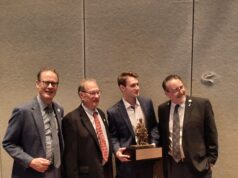
The constitutional crisis in Australia in 1975 has been one of the most written and talked about events in Australian modern history. Many observations have therefore been made to gather the facts of the circumstances and collect the understanding of participants and observers because of the significance in national politics but also because of the precedent like circumstances which could be replicated also in Australian state and territory political situations in cases where an upper house continues to revise policy, legislation and the like.
Prime Minister Whitlam (now an elder statesman) came to power in 1972. His government was innovative very often and tested the then boundaries of a pathway forward. For example the Whitlam government introduced modern no fault legislation making possible divorce when a relationship had broken down. This policy placed responsibility on the judgement of those in a marriage to make their own minds up about the future without having to resort to criteria and evidence that was too tough or exploitive by solicitors or private investigators usually at a very high cost financially. When the enabling legislation for this policy was introduced the reaction of many well intended but opposing approaches in the minds of parliamentarians was so strong that the controversy surrounding the innovation would prevail for quite some years way beyond the Whitlam government.
The Whitlam government innovated in many other areas of significant policy in the 1970s for which so many now are thankful. The provision of funding for states and territories by PM Whitlam meant the timetable for the provision of sewerage services to most in the big cities and towns were a milestone change in policy for Australians. Also the work of PM Whitlam in the creative arts and communications areas- art and media such as films and the dramatic arts were all considered break throughs that no other PM would support because they lacked capacity to make an appropriate judgement or simply lacked the daring to give Australia a way forward to lead these sectors from the doldrums where they did not belong. PM Whitlam also led a funding process to revolutionise the provision of child care (long day care with services of nurses for the very young and teachers for those preparing for kindergarten) and the expansion of preschools so all infants and the young preparing for primary school were catered for.
There were many other innovations at the political level. The debates and conflict of opinions in parliament and within PM Whitlam’s party led to rivalries and disputes, which were difficult for the PM Whitlam to manage. In the cases of some observers and many politicians threats of a challenge arose because of internal confrontations in the governing party or opponents in the parliament from other political organisations. For example the development of the modern Australian Post Office and the Whitlam decision to organise the Australian forces in a democratic but unified command basis because these policies met the criteria of many technical and top political observers led to political pressures because of the PM Whitlam’s break or break through approach to not waste a moment to get the job done for Australia. These progressive factors were often the background to review and often hostility of the Australian Senate in the early 70s-for example PM Whitlam won another election in 1974 to reinforce his role but the outcome politically in the Senate was not crucial to the survival of the PM Whitlam government in 1975. Until 1975 the convention that an upper house reviewed policy and did not reject money bills (the budget) was not under threat but all this altered in 1975 because of very strong opposition by the Queensland Premier Mr Petersen who broke an aspect of the convention concerning the senate by nominating a senator from Queensland who was not an Australia Labor Party member when a colleague of Mr Whitlam in the senate passed away (as far as I can recall given the circumstances were so many years ago). This appointment and the politics at the time (which included the sacking of other colleagues of PM Whitlam) made possible the rejection of the budget in 1975 leading to the situation where government could not continue and so an election was forced with the support of the Governor General (President) of Australia with a negative outcome for the Whitlam government. PM Whitlam lost office.
The 1970s are a long time ago but personal circumstances also played a part because of as you may be aware of my novice involvement in an unexpected dilemma because of internal politics within the then Sydney branch of the Federal Department of Education in 1973 and 1974. These events followed PM Whitlam’s confrontation after a political meeting at Parramatta (western Sydney) which led to many misunderstandings on my part about how to bring about the then dream of modern child care and preschool policies for the community. PM Whitlam was a fierce opponent of nonsense, having a go at my judgement as though he was offering a bribe. I was completely out of my depth of course. Also the situation in the office-which needed major changes-was not helped by me claiming to have the right answers and brave claims of infallibility which did not hold up to scrutiny. The leader of the opposition offered me no sympathy and pressurised the situation in any way desirable for his party but not my privacy. He was very hostile about my request to be left out of things because national politics of this nature was not my cup of tea. Other politicians including Mr Doug Anthony the head of the County Party (now the National Party) let me know they would not let me down. Overseas supporters surprisingly came from the United States-looked just like Mr Carter-but the events were a long time ago. The Americans made it clear that everyone has their day and therefore the claims by the leader of the opposition Mr Fraser for an immediate enquiry and that PM Whitlam should stand down were similarly regarded by me as right over the top. Fraser insisted dire consequences were to follow and that myself and the Whitlam government better accept this but this was not necessarily supported by the Americans-keep in mind please that it was a long time ago and my clarification may not be so pure but I am attempting to inform the reader of what took place.
The environment in the agency in Sydney was so jaded that it would not settle down-at least not settle down with me being there-so I received a minor promotion to work in Canberra where I have spent the majority of my work and political experience which of course continues. I am very thankful despite the continuing nature of personal responsibility that I was able to leave for what was for me one of the worst workplaces I have ever taken part with.
When arriving in Canberra I was free of all this pressure and nonsense but not Mr Whitlam. The conflict between Fraser and Whitlam had not improved it was worse (as we know) than ever. Fraser was busy feathering his own nest and seeking a way to be condemnatory of the Whitlam period and my experiences in Sydney. Mr Whitlam endeavoured to be personally supportive of me getting back on my feet and to function effectively the way I then felt qualified as a mature public servant which is all I felt able to do.
Some wonderful things did happen. I took part in the final negotiations to end the Vietnam War with the Governor General (President) being the chair and US and Russian leaders also taking part, and when approached also helped decide the day for the famous double dissolution-remembrance day-because that day more than any others reminds us to make the right call for democracy to take shape and all benefit. The Governor General and the PM Whitlam made it clear they were very personally supportive but I would have a lot to face up to and better develop my leadership skills to solve what would be imposed and most likely to take place because in a similar situation most would do what was best only for them-in effect the highest bidder-an not act nobly in the circumstances.
When Mr Fraser approached me or indeed Mr Whitlam or the Governor General-as far as I was ever aware-but keep in mind the squabbles were enormous and my memory scrambled at the time and still is. Fraser acted in too aggressive fashion but made clear he was not going to tolerate even as childish what had happened in Parramatta and would follow up even if it meant an unexpected poll-because Labor simply could not put its house in order and this was obvious to his immediate and long term advantage.
When PM Whitlam and the Governor General-spoke to me-obviously suffered from the blues-they tried to give friendly warnings of what might happen. I am not a lawyer nor do I have perfect memory or judgment. For example distinguishing what took place in Sydney in the 70s is an egg I cannot successfully unscramble. However when the Queen and her husband visited Sydney to open the Opera house-at least I think it was at that time but cannot be sure-the head of State-the Queen – signed legal documents-taking the pressure off me-so media coverage of all this sad and over the top event in Sydney need not go to air. Fraser detested this approach.
Pressure like this was not renewed until the dismissal period evolved. On winning public office Fraser renewed the pressure and put all participants including VIPs such as the Governor General and the Head of State on notice to account for them. As you can imagine Stephen Kendal was very scared about what was being attempted and that Fraser lacked the capacity of a balanced call about an event, which should be forgotten about. This additional pressure on the Whitlam government contributed to break and break through mentality when bringing forward policy, as the sands of politics seemed uncontrollable. At this point I became a fun organiser of the Australian American Association and found many friends there as well as a sympathetic Ambassador who genuinely liked me. But as they say everyman has his day. Life is like that.
Fraser kept the pressure up-in my opinion-as if a war was necessary-to repudiate PM Whitlam and those who made possible taking the events in Sydney away from the media for immediate community understanding. The atmosphere at that time was unpleasant. Unpleasant enough to be fearful of being repudiated publicly rather than being given understanding and liberty from nonsense. Consequently as time passed and only when necessary-it was decided to have a full blown-confrontation-about the constitution-especially the constitution oath. So something unusual but supportive of the constitution and those responsible for how it works was devised-to take place blow by blow-much needed-was devised to take place in Saint Christopher’s Cathedral-a catholic place of worship.
Admittedly this was an unusual approach-but clearly justified when Fraser announced-in the place of worship-a royal commission to investigate and recommend the process of justice-he thought required-concerning those who had been supportive of me ducking the issues in Sydney-including the head of state-who had only acted conscientiously. He went right over the top and stating the British High Commission must close and that diplomatic relations severed. I simply could not believe my ears when this all happened All of these things I considered absolute nonsense.
The US and Russia (Carter and Brezhnev were supportive). For example at a highlight of what was said by Fraser-that the Queen must stand aside and be investigated for her role-all commonwealth nations spoke directly to me ridiculing what was said. Mr Carter also made clear that nonsense such as stand down of the head of state and Fraser’s desire of a referendum then to establish a republic was way over the top. Carter made clear that what was done was far from enlightened and would be disruptive of the fundamentals of peace and disarmament throughout the world. Premier Brezhnev endorsed the approach completely. Mr Gordon Brown of the UK was present personally and opposed vigorously what Fraser intended. Leading the process of discussion from the view point of the soverign.
The catholic church-from its stand point-offered the diplomatic and sacred public exposure of the Christian Eucharist-as a sign of trust-common understanding and enlightenment of those seeking a settlement to what had transpired. No one doubts the sincerity or strength of commitment made. For example while speaking to all assembled Carter called the participants of the war between Egypt, Palestine and Israel to put down their arms and in referring to the events in Australia was able to arrange a cease fire voluntarily imposed by each of the parties. The drama of Carter’s intervention was fundamental to acknowledgement of him as a world leader leading to recognition later for a Nobel Peace prize.
For these reasons I believe a different interpretation of the dismissal being brought about by America for its own purposes seems quite misjudged but being then inexperienced and a baby was not part of any wind up talks with the US hierarchy. What followed in Saint Christopher’s is contrary to any stereotyped interpretation. It is often now claimed that the Liberals felt so let down that that in some numbers at least they are hostile and critical of the US role in Canberra.






